
by California Casualty | Nurses |
Nursing is a high-pressure profession that can lead you on a rollercoaster of emotions (especially in 2020). Some days you bawl your eyes out and want to quit, other days you witness miracles happen right before your eyes and you can’t imagine doing anything else.
To be a nurse you need to be mentally strong, especially during the middle of a pandemic. And what better way to cope, and get yourself back in a positive headspace after a long shift, than with some really relatable (and hilarious) Nurse Memes?
Check them out below!
Trying to chart like…



When it’s time for shift change




And a few more for our night shift warriors




And finally some overall good (and a bit morbid) nurse humor
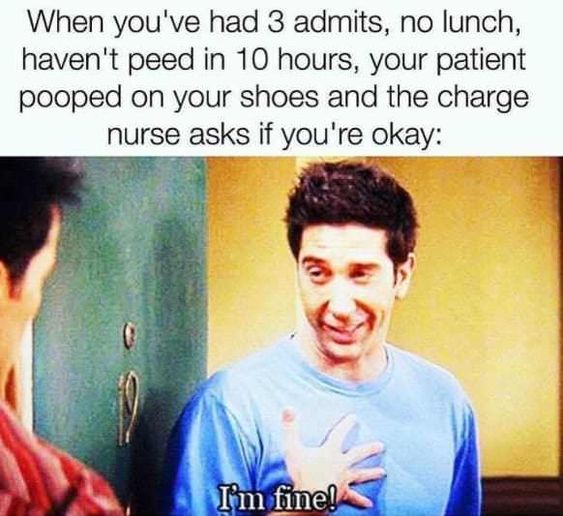


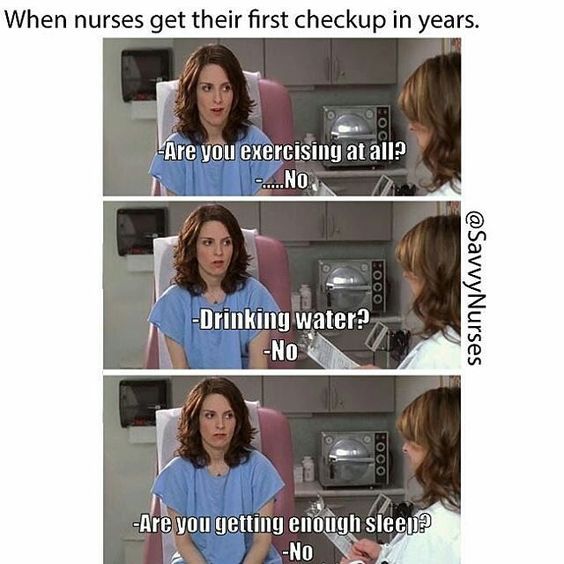


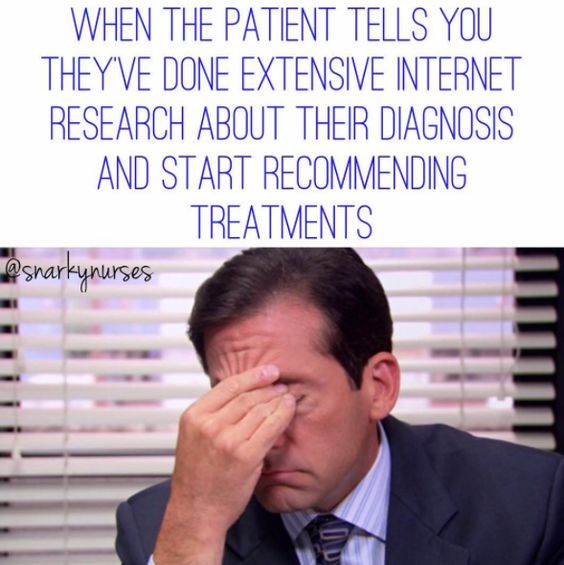
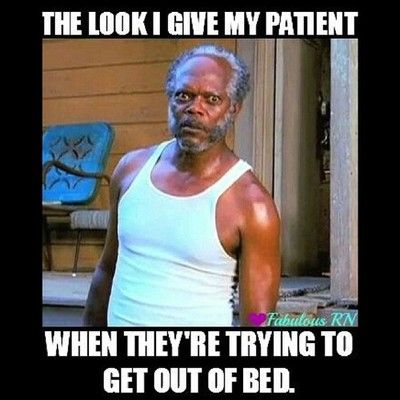



But at the end of the day

Want to keep laughing? Check out our Pinterest board “Nurse Memes”. While you’re there, don’t forget to give us a follow at California Casualty to stay up to date on every new memewe discover! Scan our Pincode with your Pinterest camera to follow:

This article is furnished by California Casualty, providing auto and home insurance to educators, law enforcement officers, firefighters, and nurses. California Casualty does not own any of the photos in this post, all are sources by to their original owners. Get a quote at 1.866.704.8614 or www.calcas.com.
by California Casualty | Behind the Scenes, Educators, Firefighters, Nurses, Peace Officers, Video |
day with firefighte
Together We CAN.
During these trying times, it’s important to know that you are not alone. You have a community of people behind you, encouraging and fighting for you.
Nurses, doctors, and other healthcare professionals are leading the fight on the frontlines against COVID-19, stepping up heroically in the face of incredibly long hours, heartbreaking care cases, and increased personal risk. Peace officers, firefighters, paramedics, and other emergency personnel are on the frontlines risking their own lives to keep our communities safe and in working order during this public health crisis. While teachers, school administrators, and education support professionals have completely changed their teaching strategies to accommodate students so they can stay safe at home and finish out the rest of the school year virtually.
We have never been more thankful for our everyday heroes than we are right now.
The coronavirus pandemic has turned our daily lives upside down, but when we come together as a community- as neighbors, as family, as friends -we are unstoppable. We CAN get through this and we WILL. Together we CAN.
We’d like to extend an extra special thanks to the Firefighters, Police Officers, Teachers, and Nurses who took the time to participate in our Together We CAN video. It is a privilege to hear about your daily experiences throughout the pandemic, firsthand. We appreciate your courage and dedication to helping keep us safe now, more than ever. Thank you.
This video is brought to you by California Casualty, providing auto and home insurance to educators, law enforcement officers, firefighters, and nurses. Get a quote at 1.866.704.8614 or www.calcas.com. Be sure to check out our Heroes series at https://mycalcas.com/leoheroesvideo/ or visit California Casualty’s YouTube Channel.
The Heroes Video Series was filmed and produced by Wide Awake Films.
If you’re not already following California Casualty, you can find us on Facebook, Instagram, Twitter, Pinterest, YouTube and LinkedIn.
At California Casualty, our mission is to provide trusted, personalized auto and home insurance protection. exclusively for educators, law enforcement, nurses and firefighters—those who protect, strengthen and enhance the quality of life in American communities.
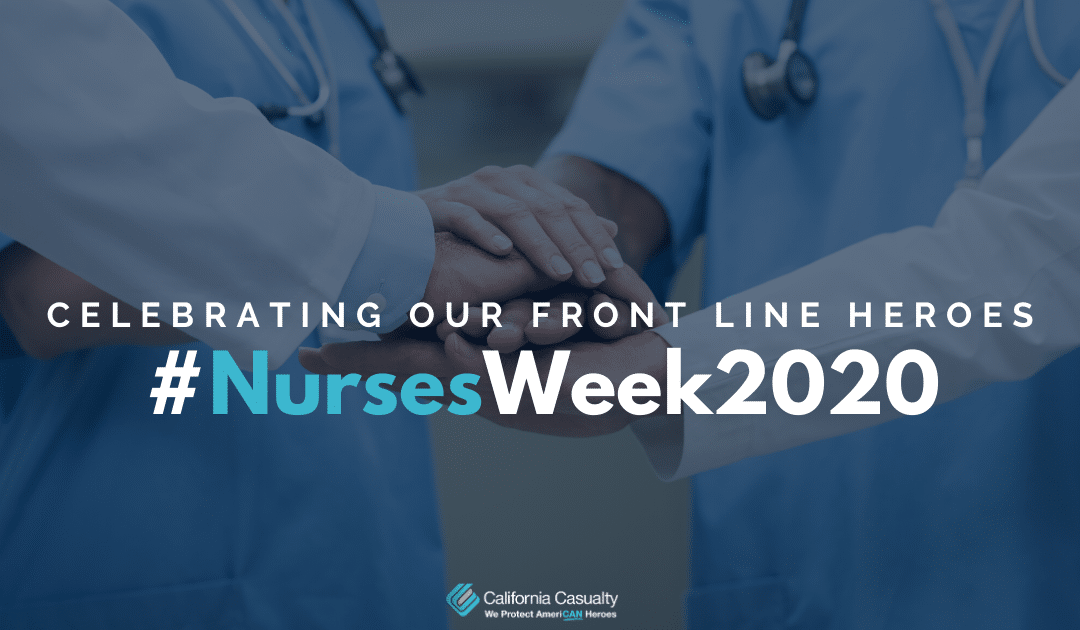
by California Casualty | News, Nurses |
Even before the coronavirus began its swift spread across the globe, the World Health Organization had declared 2020 the ‘International Year of the Nurse and Midwife,’ and the American Nurses Association (ANA) named it ‘Year of the Nurse.’ The annual observance of Nurses Week—from May 6-12—has been extended from one week to the entire month.
These designations underscore something we’re acutely aware of these days: Nurses are an incredibly important pillar of our health system, and we rely on them every day for compassionate, skilled, expert healthcare.
We also trust them immensely: For 18 years in a row, the vast majority of Americans have rated nurses as the most honest and ethical of professions.
The Many Ways Nurses Keep Us Healthy
Most people know nurses as the trusted health professional they see for health exams, emergency visits, chronic conditions, and life events such as maternity and cancer care. However, many don’t know the vast range of roles nurses play throughout the health care system—or that, numbering almost 4 million, they comprise the largest segment of health care workers in America.
This annual observance celebrating nurses is a great opportunity to highlight some of those many roles that nurses play in advancing the health and well-being of individuals, communities, and our country at large.
Direct patient care — Every day across the country, nurses care for and treat patients in a range of care settings. Although there’s no such thing as a “typical” day for a nurse, their job entails administering medications, managing IVs and other interventions, observing and recording patients’ conditions, advocating for and educating patients and their families, and providing advice, guidance and emotional support. They work in inpatient care settings, primary care, prenatal care, schools and universities, outpatient settings, palliative and hospice care, skilled nursing facilities, community clinics, and more.
Research — Nurse researchers are scientists who design and conduct studies looking at health, illness, and healthcare, aimed at improving health outcomes and delivery of care. They work in hospitals, medical clinics, and research laboratories, as well as in academic settings where they often teach.
Informatics — In this unique field, nurses blend nursing science with expertise in information technology and analytics to improve nursing practice and patient safety. Nurse informaticists are health tech innovators who create and maintain the digital health systems used by consumers, medical professionals, and public health officials.
Population Health — Population health focuses on the ways that health systems, organizations, and local agencies collaborate to drive better health outcomes at the community level. Nurses, with so much time and experience in direct patient care, readily see the patterns of health behaviors and disparities. They leverage this expertise to positively influence their patients and communities’ health in roles such as health coaches and educators, care coordinators, care navigators, and care managers.
Administration and leadership — As leaders and executives, nurses are advancing improvements to healthcare at the highest levels. Bringing their clinical expertise and management experience to bear, they are transforming care delivery and improving patient safety through their leadership roles within healthcare facilities, hospitals, institutions, government agencies, non-profit organizations, health systems, and private companies.
As the nation honors and thanks nurses throughout the month of May (and beyond!), join the movement and thank the nurses in your life for their many contributions to our health, well-being, and safety. For ideas on how to help them out during this time of crisis, check out these tips.
This article is furnished by California Casualty, providing auto and home insurance to educators, law enforcement officers, firefighters, and nurses. Get a quote at 1.866.704.8614 or www.calcas.com.

by California Casualty | Nurses, Safety |
Nurses, doctors, and health care professionals are our frontline heroes in the fight against coronavirus. With almost 4 times as many nurses as physicians in the U.S. (3.8 million vs 1.1 million, respectively), nurses are the largest segment of providers seeing, treating, comforting and providing ongoing care for the patients that are and will continue coming into hospitals and clinics.
Nurses know they will be hit hard, yet they are stepping up heroically in the face of incredibly long hours, heartbreaking care cases and increased personal risk. So, it’s time for the rest of us to step up and support them by doing our part to keep our healthcare workforce strong, healthy and resilient, we can help turn the tide on the crisis.
Here’s how you can help nurses in your community.
Stay Home
Across the country, various forms of shelter-in-place and social distancing orders have gone into effect. The basic idea is that by limiting exposure to others, we can significantly limit the spread of coronavirus infections. That will help us “flatten the curve” and prevent our hospitals from getting swamped beyond capacity. What you do matters. Stay updated on your city’s instructions by visiting its website, TV channel or social media channels.
Donate Supplies
Many facilities are in need of gloves, goggles, N95 masks, disinfectant wipes, hand sanitizer, gowns, and other PPE. Look through your closets and garage and see if you’ve got extras (new and unused) you can donate. Check your local news pages, public health agencies or health care provider’s social media pages for specific needs and drop off instructions. Some are even asking crafters to sew masks!
Follow the Care Protocol
If you feel you might be sick, contact your doctor or advice nurse about your symptoms, then follow their instructions. Given the pressure on the health system, they are working hard to provide high-quality, personalized care to their insureds via telehealth, while also ensuring that high-risk and vulnerable patients have access to emergency and hospital services. And if you haven’t done so already, cancel or postpone any elective or routine care appointments.
Be a Good Neighbor
Many of us know nurses and health care workers personally. Whether they’re in your family, friend circle or neighborhood, make a point to reach out (virtually) and check-in. See if there’s anything you can do for them or their families. This could be something like picking up groceries, walking their dog or picking up their takeout. They are and will continue to be overwhelmed—physically, mentally and emotionally. Let them know you’re there for them.
As nurses and other healthcare professionals treat more and more patients, their risk of infection increases. That’s a real danger—both to their own personal health and to the number of providers that will be available to take care of patients in the months ahead.
Never in our modern lives have our personal choices made such an impact on the health of our greater community, that is why it is so important that you help do what you can today.
This article is furnished by California Casualty, providing auto and home insurance to educators, law enforcement officers, firefighters, and nurses. Get a quote at 1.866.704.8614 or www.calcas.com

by California Casualty | Nurses |
Stress is something every person has to deal with. Some professions and fields entail greater levels of tension anxiety than others, however.
Nurses, in particular, are prone to high levels of stress and some of them aren’t skilled or conscientious about managing their symptoms. Whether it’s the long hours, staffing shortages, or having to deal with difficult patients, there’s rarely an easy day for an on-call nurse.
As a result, if you’re a nurse, you need to know how to cope with stress while you’re on the job.
Identifying the sources of stress
Can you accurately name the cause or causes of your stress? As a nurse, there are any number of possibilities, and it’s vital for you to recognize what sets you off.
Common causes of stress in a medical setting include long shifts, emotional encounters, exposure to physical trauma, and the fast-paced nature of the job. Properly handling your stress is key to both your own personal health and the health of the patients under your care.
According to a study on stress in the health-care professions, “225 physicians reported 76 incidents in which they believe patient care was adversely affected by their stress.” In other words, that means that on average, one out of every three physicians can name a time when his or her own level of stress affected the care of a patient.
That’s a striking statistic and cause for alarm if it’s not taken care of.
Strategies for coping with stress
Do you know what the fifth tenet of the American Nurses’ Association Code of Ethics says? It requires nurses to attend to their own needs and to “preserve integrity and safety, to maintain competence, and to continue personal and professional growth.”
Therefore, in order to abide by the code, you must learn how to reduce and relieve your stress. Here are a few tips on ways to do that:
- Get enough sleep.
 As a nurse, you probably spend your time telling patients to rest up and get some sleep, but are you following your own advice? You should aim for seven to eight hours of sleep between each shift. As you well know, your body uses this time to recover, and sufficient sleep will give you the energy you need to tackle issues and challenges with greater stamina and clarity.
As a nurse, you probably spend your time telling patients to rest up and get some sleep, but are you following your own advice? You should aim for seven to eight hours of sleep between each shift. As you well know, your body uses this time to recover, and sufficient sleep will give you the energy you need to tackle issues and challenges with greater stamina and clarity.
- Learn to say no.
 One powerful word — no — could change your life. When you’re stressed out and anxious, having learned to say no can be a lifesaver. Whether you’re responding to a friend asking you to enjoy a night out just before a shift, or a boss asking you to extend yourself further than you’re comfortable, it’s important to acknowledge you can’t do everything and make choices accordingly.
One powerful word — no — could change your life. When you’re stressed out and anxious, having learned to say no can be a lifesaver. Whether you’re responding to a friend asking you to enjoy a night out just before a shift, or a boss asking you to extend yourself further than you’re comfortable, it’s important to acknowledge you can’t do everything and make choices accordingly.
- Maintain social relationships. Eight- and 12-hour shifts can leave you wanting to curl up in your room by yourself, but it’s important to maintain social relationships and enjoy your life outside of work. Use this time to talk about things other than your job, and focus on separating yourself from your responsibilities.
- Take a step back. When you feel stress building up inside of you, don’t be afraid to take a step back and breathe. Simply walking outside for a few minutes can give you a little time to recharge and avoid making poor decisions.
- Eat a balanced diet.
 Finally, a well-balanced diet is critical to diminishing stress. Try reducing processed foods and incorporating more fresh fruits and vegetables into your diet. If possible, bring your own meals to work and avoid the temptation to eat vending machine selections and fast food.
Finally, a well-balanced diet is critical to diminishing stress. Try reducing processed foods and incorporating more fresh fruits and vegetables into your diet. If possible, bring your own meals to work and avoid the temptation to eat vending machine selections and fast food.
Auto insurance for nurses
At California Casualty, we are committed to giving nurses peace of mind and protection by offering high-quality, dependable auto insurance policies. For additional information on our various policies and how they can protect you, please contact us today!
This article is furnished by California Casualty, providing auto and home insurance to educators, law enforcement officers, firefighters, and nurses. Get a quote at 1.866.704.8614 or www.calcas.com.
by California Casualty | Nurses |
As a night shift nurse, your schedule is anything but normal (not that a nurse’s schedule is normal). While the rest of us are sound asleep in our beds, you – the night time warrior of the caring – are on a different time shift.
Nurses who have to sleep during the day face troubles people wouldn’t think about at night, all the lights are off, it’s mostly quiet outside, and usually, everything seems calm BUT as a night shift nurse, everything is backward. Because your night time is during the daytime, you need the know the secrets to getting the best sleep you can.
Turn off the distractions: Put your phone on silent, turn off the tv, and get your mind ready for some sleep.
Darken the room: Hang up dark curtains, grab an eye mask to wear, and even consider earplugs to blackout the light and noise.
Exercise Daily: Hit the gym or just go on a 30-minute walk, anything that will help you release stress and pent up energy.
Cool Temperature: Keeping the room at a cooler temp can help your body relax.
Avoid Caffeine: As the shift winds down, slowly stop drinking that coffee or soda and by the time you get home your body won’t feel as stimulated.
Exercise: Eating right, exercising daily, and drinking water also keeps your body on a natural daily routine.
The more you make your environment look and feel like nighttime, the easier it will be for your body to adapt for daytime sleeping.
This article is furnished by California Casualty, providing auto and home insurance to educators, law enforcement officers, firefighters and nurses. Get a quote at 1.866.704.8614 or www.calcas.com.































